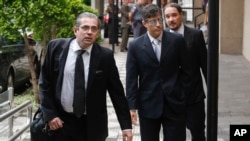Sao Paulo state prosecutors said Thursday they filed money laundering and criminal misrepresentation charges against former President Luiz Inacio Lula da Silva because of evidence he and his family unduly benefited from a real estate scheme that adversely affected thousands of Brazilian families.
Lead prosecutor Cassio Conserino said the former president and his family were swept up in a yearslong investigation into wrongdoing at a failed cooperative in Sao Paulo that sold apartments at cost. The case against Silva hinges around a triplex in one of the residential towers built by the cooperative, which prosecutors allege was destined for the former leader and his family.
“While thousands of families lost their apartments and saw their dreams of becoming homeowners shattered, one of those investigated received a triplex,” Conserino said at a news conference.
Silva has denied any wrongdoing and said he is not the owner of the apartment in the coastal city of Guaruja. In a statement Wednesday, his not-for-profit Instituto Lula suggested Conserino is biased against the former president.
Conserino and the other prosecutors at Thursday's news conference insisted they are neutral and just following the letter of the law.
“The investigation is sustained with procedural and documental evidence,” Coserino said.
The state public prosecutors' office brought the charges against Silva, as well as money laundering charges against his wife and one of his sons, late Wednesday. For Silva himself, conviction on the two charges could carry a maximum sentence of 13 years in prison.
The judge in the case must now decide whether to accept the charges and move forward with the case.
Conserino said he had no idea when that might happen, suggesting that due to the sheer volume of the case it might take some time.
Conserino declined to respond to repeated questions of whether prosecutors had asked that Silva be provisionally detained. But Finance Minister Nelson Barbosa told reporters the Sao Paulo prosecutors had indeed made such a request, which would also have to be signed off on by the judge in the case.
“This request is totally baseless,” Barbosa told reporters gathered at a Sao Paulo hotel where the Insituto Lula was holding a debate about the economy. Barbosa added that “this polarization is doing much harm to the Brazilian economy.”
In a separate statement Thursday, the Insituto Lula dismissed the request as “another sad attempt” by Conserino to “use his job for political ends.”
The Sao Paulo case is only part of Silva's legal woes.
Last Friday, federal investigators said they were looking into whether renovations at the Guaruja beachfront apartment and another project at a country house used by Silva and his family constituted favors in exchange for political benefit.
Both places have undergone major renovations paid for by construction companies that for decades have had contracts with the federal government. Those enterprises are also at the center of the scandal gripping the state energy company, Petrobras, in which prosecutors allege $2 billion was paid in bribes to obtain contracts with the company.
Conserino stressed that the state investigation was different from the federal probe because Sao Paulo prosecutors were looking into the ownership of the apartment and not into the renovations that took place inside.
Silva acknowledges having visited the penthouse twice, but says he never owned the apartment. He claims the country house belongs to friends who allowed him and his family to use it.
Federal investigators are also trying to determine if Silva sold his influence in the current administration of President Dilma Rousseff in exchange for speeches and donations to his nonprofit foundation Instituto Lula.
Brazilian newspapers carried reports Thursday quoting anonymous sources close to Silva as saying he is considering an offer of a ministerial posting in Rousseff's government. If Silva held such a post, the Supreme Court would have to authorize any detention order for him as well as approve the filing of any future charges against him.
Silva governed from 2003 to 2010. Despite a votes-for-bribes scandal that took down his chief of staff and others, he left office with record high popularity levels and his hand-picked successor, Rousseff, handily won the presidency.
Rousseff has seen her popularity nosedive as Brazil has slipped into its worst recession in decades and corruption investigations have spread. She is facing an impeachment effort in congress.




